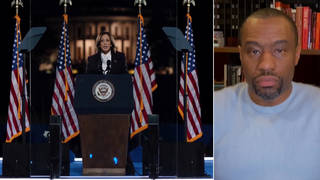
Related
Guests
- Roberto Lovatoauthor of the forthcoming book Unforgetting: A Memoir of Revolution and Redemption. He’s a co-founder of the campaign #DignidadLiteraria, which has supported debate over the novel American Dirt and sought to elevate the voices of Latinx writers in U.S. literature.
President Trump delivered his 2020 State of the Union address to a joint session of Congress on Tuesday. The speech reprised many of the themes of Trump’s 2016 campaign, including demonization of immigrants. We continue our discussion with Lee Fang, investigative journalist at The Intercept, and Roberto Lovato, author of the forthcoming book “Unforgetting: A Memoir of Revolution and Redemption.” About 10 Democrats skipped the speech and a few more walked out while it was in progress, but Lovato says the Democratic establishment doesn’t differ with Trump on many key issues. “Nancy Pelosi may have ripped the speech, but they both draw from the same playbook on issues like immigration, foreign policy, corporate domination. Trump knows that,” Lovato says.
Transcript
JUAN GONZÁLEZ: Well, Trump also had much to say about immigration. And I wanted — let’s see if we have that clip, when he talks in his State of the Union.
PRESIDENT DONALD TRUMP: If forcing American taxpayers to provide unlimited free healthcare to illegal aliens sounds fair to you, then stand with the radical left. But if you believe that we should defend American patients and American seniors, then stand with me and pass legislation to prohibit free government healthcare for illegal aliens. This will be a tremendous boon to our already very strongly guarded southern border, where, as we speak, a long, tall and very powerful wall is being built. We have now completed over 100 miles and have over 500 miles fully completed in a very short period of time. Early next year, we will have substantially more than 500 miles completed.
JUAN GONZÁLEZ: That was President Trump last night. We’re joined now by Roberto Lovato, award-winning journalist. Roberto, your take on the president’s remarks last night about immigration, and also not only about immigration, but supposedly the huge crime wave that’s occurring as a result of sanctuary cities permitting undocumented immigrants who were jailed by local — from ICE detainers?
ROBERTO LOVATO: It’s become predictable. If you look at last year’s State of the Union address, it’s some of the same tropes, same criminals, same immigrants, stealing jobs. I mean, this is tried-and-true for them, and the Republicans are going to use it because it works for them. And Trump is also playing to the fact that the Democrats don’t really have much to offer on immigration. Nancy Pelosi may have ripped the speech, but they both draw from the same playbook on issues like immigration, foreign policy, corporate domination. And so, Trump knows that.
And something that was clear to me, for example, was that Trump didn’t say anything about El Paso — right? — where you had all these Latinos that were murdered, mass murdered, by a white killer who was inspired by Trump’s rhetoric and that of the extreme right. And so, you didn’t have any of those victims in the audience. You know, you had other victims. And we’re in a very dangerous time. And I think that immigration helped Trump get started, and he’s going back to it because it works for him.
And it puts the Democrats in the uncomfortable position, for example, of hiding the fact that when it comes to things like mass deportations, when it comes to things like caging children, when it comes to things like the separation of children from their mothers by the thousands, this was Barack Obama that started us on that path, not Donald Trump. And so, you know, you see it when, in the Iowa — in the Democratic debate, all the candidates run like rats when the lights go on, when it comes to Barack Obama. They don’t want to touch him, because people, especially in the Latino community, know. We have the receipts of what happened with immigration and Obama. And so, Trump knows this, and he’s playing that card that shows that they have nothing to offer.
AMY GOODMAN: And this whole issue, as he was talking about “criminal aliens,” all the studies show that people who are not native-born are less likely to commit crimes, whether violent or nonviolent. And interestingly, as he touted the wall, just a few weeks ago, newly installed panels from the U.S. border wall fell over — this was from California — into Mexico, two weeks ago, because of high winds.
ROBERTO LOVATO: Yeah. The wall is symbolic not just of immigration. I think it’s the closing of the U.S. mind. And that’s the trap that I think the Democrats have fallen into, that they’ve played to anti-immigrant sentiment, except instead of saying racist tropes, they’ve said, ”Sí, se puede.” At a material level, at the level of the immigrant body, the tortured, the starved, dehydrated, the dead child at the river and in the desert, there’s not that much of a statistical difference between Obama and Trump. And so, Trump knows — Trump’s strategists know what they’re doing when they’re deploying immigration as an electoral tactic and part of the core strategy.
JUAN GONZÁLEZ: President Trump also talked last night about Venezuela, a subject over which he hasn’t been saying much in the last several months. But this is what he said last night.
PRESIDENT DONALD TRUMP: Maduro is an illegitimate ruler, a tyrant who brutalizes his people. But Maduro’s grip on tyranny will be smashed and broken. Here this evening is a very brave man who carries with him the hopes, dreams and aspirations of all Venezuelans. Joining us in the gallery is the true and legitimate president of Venezuela, Juan Guaidó.
JUAN GONZÁLEZ: And the president then pointed to Juan Guaidó, who was in the gallery and stood up and got applause from both Democrats and — I mean, not only Republicans, but, from what I can see, from most Democrats, as well.
AMY GOODMAN: That’s right. There’s Nancy Pelosi on the podium right behind Trump, who, within minutes, would be ripping up his speech, standing up and applauding.
ROBERTO LOVATO: This is why I started off my comments talking about the way that the Democrats use the same playbook as the Republicans. At the core level of, say, foreign policy, militarism and staging coups and economic neoliberalism, there isn’t that much of a great difference, which is what I think the Sanders threat brings to both parties, because the Democrats are in check. I mean, I look at the irregularities, for example, in Iowa. I’m looking at a president who has been impeached, and I look at the appointment of a foreign leader by fiat, by tweet, and now by television, televised speech. It’s harkening back to kind of a digital age Latin American dictatorship. We’re watching what I would call the latinoamericanización of U.S. politics, when you have the division between rich and poor being so stark.
And so, Guaidó’s being there is just their continued efforts to prop up this failed most recent coup attempt, that’s been going on almost 20 years in Venezuela. I’ve been on the show here with both of you and talked about Leopoldo López, who is really the great eminence behind the throne of the Venezuelan right, of the extreme right, because the Venezuelan opposition is vast. It’s broad. And the U.S. and Elliott Abrams, who I know from El Salvador and his support for mass murderers of children in places like El Mozote, is supporting the most extreme elements. And so, you have here the introduction of Guaidó to prop him up, but also, I think, to play against Bernie Sanders and the socialist theme.
You heard Trump referring to socialism. He repeated the term, just like he repeated the tropes of civilizational warfare, civilization. He even said the word “barbarians.” So you have terrorists, immigrants, criminals — all these codewords, all this red meat, as Lee Fang said, being used for the base. I mean, again, both Democrats and Republicans play to these themes in different ways, except that, for example — I mean, they both draw from a guy named Samuel Huntington, who brought us to the age of civilizational warfare as kind of the post-Cold War narrative of a United States in decline.
JUAN GONZÁLEZ: Also, Trump’s mention of Guaidó as the legitimate president of Venezuela, with 59 countries recognizing him, obscures the fact that there’s over 100 countries that still recognize the current government of Venezuela.
ROBERTO LOVATO: Yeah, it’s theater. It’s all political theater at this point. It’s a global political theater. And it’s going to continue, because the United States still has, after 20 years, failed to destabilize and remove the Venezuelan government.
AMY GOODMAN: And, of course, you also have the complicity of the corporate media, the mainstream media. CNN, when Juan Guaidó’s wife came to Washington and had a meeting with Trump in the White House, the lower third, the description on CNN, was “the first lady of Venezuela,” Juan Guaidó’s wife.
ROBERTO LOVATO: It really is absurd. I mean, I was on your show some years back when Leopoldo López, in 2014, tried to stage a coup, and I brought up the fact that I had been — I received death threats, with a gun included, from allies of Guaidó and Leopoldo López, his mentor. And I got calls from a guy named Agent Mike Ranger, who sounded like Captain America, curious about the death threat. And yet, I asked him, “Well, where — how do you know about this, if I didn’t report it to the authorities?” He says, “I’m not at liberty to tell you, sir.” So, these are really — I mean, it’s a joke at one level, but you’re dealing with the extreme right, extremely violent. And I encourage people to just google “Juan Guaidó” and “narco killers” or “narco murderers,” and you’ll see pictures of Juan Guaidó at the Colombian-Venezuelan border with people that the Treasury Department has identified as hardened mass-killing narcoterrorists.
AMY GOODMAN: Well, I want to thank you so much for being with us and ask you to stay with us for our next segment, award-winning journalist Roberto Lovato, here in New York. And thanks so much to Lee Fang of The Intercept. We’ll link to your pieces.
This is Democracy Now! When we come back, American Dirt, the controversy around it, and why Latinx writers are now declaring victory. Stay with us.












Media Options